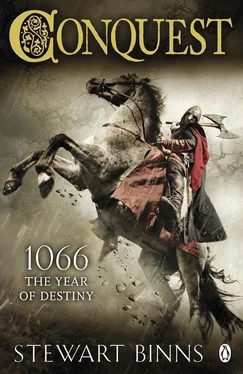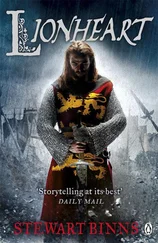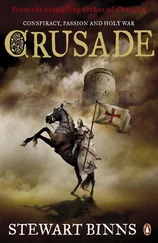Hereward found the depressing reports hard to take, especially the news of brave Eadric’s submission and that of the courageous Waltheof, who had decapitated Normans at York as if they were daisies in a field.
Hereward’s men were stood down and given leave until the autumn. They were to return at the beginning of October, after the harvest. The rendezvous would be at a ford over the Great Ouse just outside Huntingdon, a place all soldiers knew well. Standing the men down was a huge risk, as many might not return, but Hereward had no choice. He had no more speeches to give and no more rallying calls to issue. He had not given up, but he did not know how to continue.
His senior retinue stayed with him. Edwin had no family left, as his father and brothers had died on Senlac Ridge. Although Edmund had a family in Kent, he refused to go, perhaps fearful of what he might find. As for Gohor, he let his men go, but he decided to stay; he had adopted the womenfolk in his care, just as they had adopted him, and he now felt part of the family.
Now, as a renegade band of just fourteen souls, they travelled through England’s heartland in an arc from the Avon and the Thames to the Stour and the Trent. They kept on the move, stayed away from villages and burghs, and spoke only to the poor people of the land in their isolated communities. From a distance, they watched the Normans build their mottes and baileys and saw their soldiers scurrying about their duties.
Hereward avoided the subject of the rebellion and would not be drawn on his thoughts or his state of mind.
Accompanied only by his daughters, Gunnhild and Estrith, he made a private pilgrimage to the holy sisters at Hereford, and from there to visit Torfida’s grave. On his return, he offered few details of the trip, except to say that the nuns had taken her to a wonderful resting place in a clearing she often talked about, deep in the forest and close to the summit of Pennard Hill near Glastonbury.
There were commanding views across the water meadows below that were not unlike the fens of his own home. Glastonbury Tor stood proudly in the distance, a towering symbol of Harold, of Wessex and of England. The grave had been marked by an oak sapling, reared from an acorn gathered from the place where she had died. The nuns had called the clearing ‘Torfida’s Glade’ and made pilgrimages there to pray.
Hereward was content that it was an idyllic resting place for his wife, where her soul could mingle with the heritage of the wildwood.
In the middle of August 1070, Hereward announced that he would like to undertake another pilgrimage. It would be to Bourne, his Lincolnshire home, a place he had not visited in a very long time and somewhere his girls had never seen. This journey would not be a private one; he wanted his companions to see the enigmatic Fens and his unremarkable birthplace.
In the turmoil of a conquered England, he had no idea if his family would still be there. He had often thought about them and had vowed that, when the time was right, he would return.
Several days later, they could see in the distance the small bronze cross above the unassuming wooden church of Bourne. Little seemed to have changed as they moved through ever-widening clearings of the Bruneswald to reveal fenlands stretching far into the distance. The Fens were just as challenging as the Pennines, but the trials were different. The most ominous presence was the ground itself, often an impenetrable melange of water and earth, matted by centuries of the decay and renewal of reeds, moss and sedge. There were many rivers and streams, but their courses were concealed by undergrowth so dense, it made them unnavigable.
To the north-east was The Wash and the beginnings of the North Sea, but where land ended and sea began was impossible to chart and constantly changing. There were few landmarks or vantage points and the ground was so unpredictable, it would bear the weight of a man in one moment, but become a deep bog in the next. The few settlements that did exist stood on higher ground, often no more than a few feet above the vast quagmire.
Bourne was on the western periphery of fenland, on the old Roman route north, with the giant Bruneswald to the west, and the morass of the wetlands to the east. Before they got to the village, Hereward made a private excursion to Gythin’s cottage nearby. It had become an overgrown ruin, but he found the small mound, marked by a pile of stones, where his father and his men had buried her pitiful remains seventeen years ago. He stayed and reflected for over an hour, evoking memories of his wayward youth and the needless tragedy that had befallen a harmless woman.
Later, when he had regained his small band of followers and they were within a mile of the village, Alphonso noticed something about twenty yards off the track. It looked like a pile of discarded clothes in the thick undergrowth.
Martin’s equally sharp vision recognized the bundle immediately. ‘It’s a child.’ He rushed over, picked up the lifeless little heap and brought it to Hereward.
It was indeed a child, a little boy, filthy and cold to the touch and barely breathing.
Hereward sensed danger. ‘The fact that he’s here could mean that all is not well in Bourne. Alphonso, go and see what’s happening. Let’s move into the trees and get some nourishment into this boy.’
Alphonso was soon back with a shocked look on his face. He pulled Hereward away from the others and sat him on the trunk of a fallen tree. ‘The Normans are there; they are inside the longhouse. I counted nine horses.’
Hereward made to get up, thinking the village was in imminent danger.
Putting a heavy hand on his shoulder, Alphonso shook his head. ‘I’m sorry, we’re too late. There are bodies all over the village and all the houses are burned to the ground except the longhouse and the church.’ He then hesitated for a moment and swallowed hard. ‘There are three heads on lances outside the church. I think one is the priest; the others are an elderly man and woman.’ He paused again, knowing that Hereward would have realized what the news implied. ‘This boy must be the only one who got away.’
Hereward lowered his head and grasped it firmly in his hands. Alphonso walked away to join the others. By the time he had reached them, Hereward was on his feet, marching with purposeful strides towards Bourne.
‘Martin, stay here and keep everybody safe. Watch the trees and the road; there are Normans around. Alphonso, Einar, follow me. When I go into my father’s house, wait outside. If any Normans try to leave, cut them down.’
Hereward’s companions were used to taking his orders and acting on them precisely, so they stood and watched as their leader pushed open the door of his parents’ longhouse. They could see the three heads impaled on lances next to the church, their expressions strangely calm, their eyes closed, as if in repose. One of the men had the tonsured scalp of a monk, leading to the obvious conclusion that the grisly heads were those of the village priest and the thegn and his wife, Hereward’s parents.
The scene that confronted Hereward as he walked into the house in which he had been born more resembled a brothel than a family home. Food and drink were strewn across the table and floor, half-naked men dozed around the embers of the fire and the room stank of stale sweat, urine and vomit. Huddled together and cowering in the corner were three young village girls, perhaps fourteen or fifteen years old. They looked terrified and pulled the rug they were hiding behind tightly to their chins.
Hereward gestured to them to stay quiet, but two of the Normans stirred.
One of them spoke. ‘What do you want?’
Hereward did not answer.
Читать дальше












